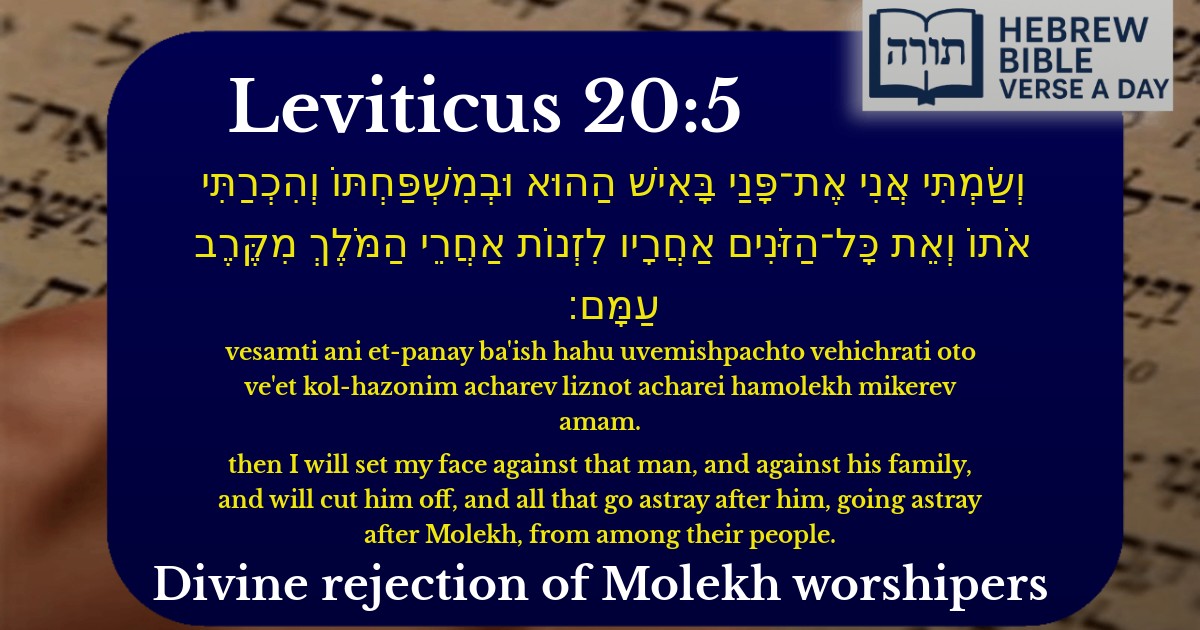Join Our Newsletter To Be Informed When New Videos Are Posted
Join the thousands of fellow Studends who rely on our videos to learn how to read the bible in Hebrew for free!
Hebrew Text
וְשַׂמְתִּי אֲנִי אֶת־פָּנַי בָּאִישׁ הַהוּא וּבְמִשְׁפַּחְתּוֹ וְהִכְרַתִּי אֹתוֹ וְאֵת כָּל־הַזֹּנִים אַחֲרָיו לִזְנוֹת אַחֲרֵי הַמֹּלֶךְ מִקֶּרֶב עַמָּם׃
English Translation
then I will set my face against that man, and against his family, and will cut him off, and all that go astray after him, going astray after Molekh, from among their people.
Transliteration
Vesamti ani et-panay ba'ish hahu uvemishpachto vehichrati oto ve'et kol-hazonim acharev liznot acharei hamolekh mikerev amam.
Hebrew Leining Text
וְשַׂמְתִּ֨י אֲנִ֧י אֶת־פָּנַ֛י בָּאִ֥ישׁ הַה֖וּא וּבְמִשְׁפַּחְתּ֑וֹ וְהִכְרַתִּ֨י אֹת֜וֹ וְאֵ֣ת <b>׀</b> כׇּל־הַזֹּנִ֣ים אַחֲרָ֗יו לִזְנ֛וֹת אַחֲרֵ֥י הַמֹּ֖לֶךְ מִקֶּ֥רֶב עַמָּֽם׃
וְשַׂמְתִּ֨י אֲנִ֧י אֶת־פָּנַ֛י בָּאִ֥ישׁ הַה֖וּא וּבְמִשְׁפַּחְתּ֑וֹ וְהִכְרַתִּ֨י אֹת֜וֹ וְאֵ֣ת ׀ כׇּל־הַזֹּנִ֣ים אַחֲרָ֗יו לִזְנ֛וֹת אַחֲרֵ֥י הַמֹּ֖לֶךְ מִקֶּ֥רֶב עַמָּֽם׃
🎵 Listen to leining
Parasha Commentary
📚 Talmud Citations
This verse is quoted in the Talmud.
📖 Sanhedrin 64b
The verse is cited in the context of discussing the severity of idolatry, particularly the worship of Molekh, and the consequences for those who engage in such practices.


Context and Meaning of the Verse
The verse (Vayikra 20:5) addresses the severe prohibition of worshiping Molekh, a pagan deity associated with child sacrifice. The Torah warns that Hashem will "set His face" against the individual and his family, cutting them off from the nation for this grave transgression. The term "cutting off" (כרת) implies both divine punishment and potential excision from the World to Come (Olam Haba), as discussed in Rambam's Hilchot Teshuvah (8:1).
Rashi's Explanation
Rashi clarifies that "setting His face" means Hashem will direct His full attention to punish the offender, leaving no room for mercy. The inclusion of the family suggests that if they were complicit or failed to protest the sin, they share in the punishment. Rashi also notes that "all that go astray after him" refers to those who follow his example in idolatry, emphasizing the communal danger of spiritual corruption (Rashi on Vayikra 20:5).
Severity of Worshiping Molekh
The Talmud (Sanhedrin 64a) elaborates that Molekh worship was particularly abhorrent due to its association with child sacrifice, a practice utterly contrary to Jewish values. The Rambam (Mishneh Torah, Hilchot Avodah Zarah 6:3) rules that this sin is punishable by karet (excision) and, in certain cases, the death penalty by the court.
Collective Responsibility
The mention of the family underscores the Torah's emphasis on communal accountability. The Midrash (Sifra Kedoshim 9:12) explains that a family's silence in the face of such a sin makes them accomplices. This aligns with the principle that "all of Israel are responsible for one another" (Shevuot 39a).
Spiritual Implications of "Karet"